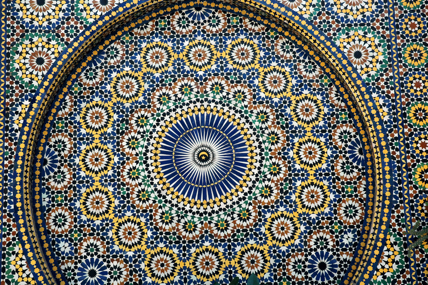Also see Kafr al-Hanadwa’s take on a NPR program discussing the Oren’s book, along with Rami Khouri and Fouad Ajami.
Update: More Israeli alarmism by Barry Rubin and a call to Jewish organizations to get tough on Iran.
Continue reading Oren on Iran
Also see Kafr al-Hanadwa’s take on a NPR program discussing the Oren’s book, along with Rami Khouri and Fouad Ajami.
Update: More Israeli alarmism by Barry Rubin and a call to Jewish organizations to get tough on Iran.
Continue reading Oren on Iran
Well, that’s my culinary nationalism post of the day done. Also, one of the most beautiful books you could ever read on Fez, or on Sufi Islam for that matter, is Titus Burckhardt’s amazing Fez: City of Islam. Below: detail from a public fountain in Fez.

In 1992, the Somali-born author of The Caged Virgin, Ayaan Hirsi Ali, arrived in Holland as a refugee. She was granted citizenship in 1997, and six years later elected to parliament, where she focused on immigration policy. Hirsi Ali collaborated with Dutch filmmaker Theo Van Gogh, writing the screenplay for Submission 1, a film about women suffering from a repressive Islam. When Van Gogh was murdered by a Muslim in 2004, Hirsi Ali’s life was threatened and her celebrity enhanced. In 2005, TIME magazine named her one of the ‘world’s 100 most influential people’.
A photograph in the New York Review of Books (October 5, 2006) shows the attractive Hirsi Ali at a TIME-sponsored party chortling with fellow influential person, Condoleezza Rice. In the accompanying review, Timothy Garton Ash notes his ‘enormous respect for her courage, sincerity and clarity.’ The American Enterprise Institute (AEI), a think-tank close to the Bush Administration, apparently feels the same way. They made Hirsi Ali a fellow following her abrupt withdrawal from Dutch politics. Hirsi Ali’s resignation was owed in part to the controversy surrounding her falsification of personal data when requesting asylum, but also her opposition to Dutch tolerance and multiculturalism on the ground that it perpetuates ‘backwardness’, especially in Muslim immigrants.
‘[Muslim immigrants] only rarely take advantage of the opportunities offered in education and employment’ she writes in The Caged Virgin, and a restrictive Islam is what is holding them back. ‘By our Western standards, Mohammed is a perverse man. A tyrant. If you don’t do as he says, you will end up in hell. That reminds me of those megalomaniac rulers, Bin Laden, Khomeni, Saddam…..You are shocked to hear me say these things…you forget where I am from. I used to be a Muslim; I know what I’m talking about.”
This credential may have impressed the AEI, but it falls somewhat short when attempting to prosecute a religion and the multifarious peoples that profess it. It’s not that Hirsi Ali says outright that all Muslims are fundamentalists; she just attributes fundamentalist beliefs and practices to all Muslims.
[Thanks, SP]
Two police corporals are currently under investigation for attempting to rape a woman in Tahrir Square’s underground metro (Sadat Station) on Wednesday, Al-Masry Al-Youm reports.
The woman approached a police corporal inside the underground station, asking him for directions to the nearest exit to KFC at 1:30pm. To her surprise, he pointed at the security office in the station, and told her that was her destination, before grabbing her to the office and attempting to rape her with the help of another police corporal. The woman managed to escape, in complete trauma with torn clothes.
This could happen to your sister or mother.
Unfortunately, while this just may be gross bias, I suspect it’s something worse: lack of professional integrity and laziness.
Fine police work, boys.
I liked it better when this was a colorful crime story. Now I’m not sure if the crime is more sinister than the response.
(Incidentally The Agonist is a great site that was a direct inspiration for this one. Bookmark it if you haven’t already.)
Egypt-rights-Internet-torture-trial,sched-FEATURE
Egypt bloggers reveal new torture case
by Paul SchemmCAIRO, Feb 1, 2007 (AFP) – Egypt’s politically active blogger community has brought to light another torture case against the regime’s security services amid a rising tide of outrage over police brutality.
On Saturday, lawyers from the Association for Human Rights and Legal Aid (AHRLA) will go to court in a last-ditch effort to keep alive the case against a state security officer accused of torturing to death a man he arrested three and a half years ago.
The case against Captain Ashraf Safwat is gaining new attention following the decision by Egypt’s activist blogger community to post the details online in the wake of several other cases of police brutality in recent weeks.
“The most significant aspect of the case is this is the first state security officer to truly be put in front of a criminal court,” said Mohsen Bahnasi, a member of AHRLA’s board, referring to the country’s feared plainclothes security service.